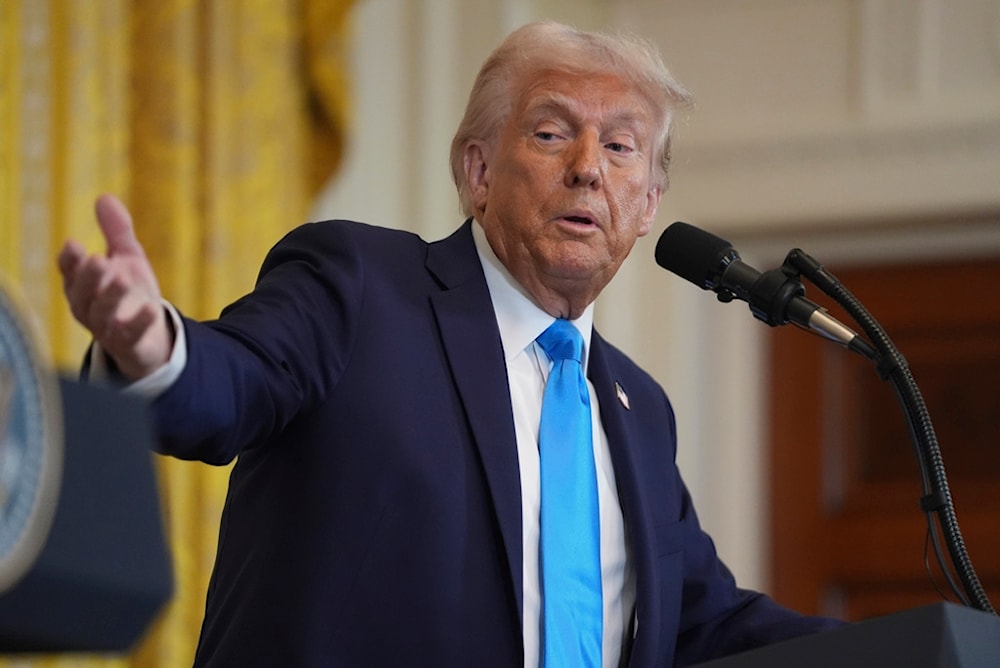'Everybody loves it,' Trump says on Gaza ethnic cleansing plan
The United Nations and the EU have reiterated that Gaza's future should be determined through diplomatic negotiations, not unilateral action.
-

President Donald Trump speaks during a news conference with Israel's Prime Minister Benjamin Netanyahu in the East Room of the White House, Tuesday, February 4, 2025, in Washington. (AP)
US President Donald Trump on Wednesday stood by his controversial suggestion that the United States assume control of the Gaza Strip, dismissing international criticism and insisting that the plan has been well received.
"Everybody loves it," Trump told reporters in the Oval Office when asked about the overwhelmingly negative reaction from Palestinians, Middle Eastern leaders, and global governments. However, he declined to elaborate further, stating that it was "not the right time" for discussion as he was presiding over the swearing-in of the new US Attorney General Pam Bondi.
Trump's plan, which envisions displacing Gaza's Palestinian residents to neighboring countries such as Egypt and Jordan, has been widely condemned by international leaders. Critics, including Palestinian officials, human rights groups, and foreign governments, argue that forced displacement violates international law and would escalate tensions in the region.
Middle Eastern governments, including Jordan, Egypt, Saudi Arabia, and Qatar, have firmly rejected the proposal. Jordan's Foreign Minister Ayman Safadi declared that his country would not participate in the forced removal of Palestinians, while Egypt dismissed the plan over concerns about demographic and security implications. Saudi Arabia and the UAE have also distanced themselves from the proposal, reiterating that any resolution should align with existing peace frameworks.
In Europe, German Foreign Minister Annalena Baerbock denounced the proposal, warning that removing Gaza's civilian population would "lead to new suffering and new hatred". The French Foreign Ministry rejected any foreign control over Gaza, reaffirming that a two-state solution remains the only legitimate path forward. Spain's Foreign Minister José Manuel Albares echoed this sentiment, stressing that Gaza belongs to the future Palestinian state.
Read more: Europe condemns Trump's Gaza relocation plan as illegal, unacceptable
The United Nations and the EU have reiterated that Gaza's future should be determined through diplomatic negotiations, not unilateral action. The UN specifically warned that forced displacement would destabilize the region, exacerbating an already volatile situation.
Legal concerns
Human rights organizations have gone further, labeling the proposal as a form of ethnic cleansing. Groups such as Human Rights Watch and Amnesty International warn that forcibly removing Gaza's population would violate the Geneva Conventions and set a dangerous precedent for future conflicts.
Palestinian leaders have also denounced the plan as an assault on their right to self-determination. The Palestinian Authority (PA) has insisted that Gaza is an inseparable part of any future Palestinian state, warning that such a move could create long-term instability.
Read more: Saudi Arabia reaffirms commitment to Palestinian statehood
The plan has also faced resistance from Republican lawmakers within the United States. Senators Lindsey Graham and Thom Tillis have questioned the practicality and long-term consequences of a US takeover of Gaza, warning that it could entangle the country in another prolonged military engagement, as per a report by The Guardian.
"I think that would be an interesting proposal. We’ll see what our Arab friends say about that. I think most South Carolinians would not be excited about sending Americans to take over Gaza," Graham told reporters. "I think that might be problematic. But I’ll keep an open mind."
"That would be a tough place to be stationed as an American, would be Gaza," he continued.
While some members of Congress have aligned with Trump's rhetoric, both Republican and Democratic leaders have called the proposal unworkable and unlawful.

 4 Min Read
4 Min Read








